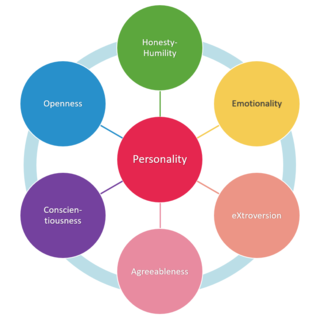Related Research Articles
Twin studies are studies conducted on identical or fraternal twins. They aim to reveal the importance of environmental and genetic influences for traits, phenotypes, and disorders. Twin research is considered a key tool in behavioral genetics and in content fields, from biology to psychology. Twin studies are part of the broader methodology used in behavior genetics, which uses all data that are genetically informative – siblings studies, adoption studies, pedigree, etc. These studies have been used to track traits ranging from personal behavior to the presentation of severe mental illnesses such as schizophrenia.
Narcissistic personality disorder (NPD) is a mental disorder characterized by a life-long pattern of exaggerated feelings of self-importance, an excessive need for admiration, and a diminished ability to empathize with others' feelings. Narcissistic personality disorder is one of the sub-types of the broader category known as personality disorders. It is often comorbid with other mental disorders and associated with significant functional impairment and psychosocial disability.
Political polarization is the divergence of political attitudes away from the centre, towards ideological extremes.
Sociosexuality, sometimes called sociosexual orientation, is the individual difference in the willingness to engage in sexual activity outside of a committed relationship. Individuals who are more restricted sociosexually are less willing to engage in casual sex; they prefer greater love, commitment and emotional closeness before having sex with romantic partners. Individuals who are more unrestricted sociosexually are more willing to have casual sex and are more comfortable engaging in sex without love, commitment or closeness.
Moral psychology is a field of study in both philosophy and psychology. Historically, the term "moral psychology" was used relatively narrowly to refer to the study of moral development. Moral psychology eventually came to refer more broadly to various topics at the intersection of ethics, psychology, and philosophy of mind. Some of the main topics of the field are moral judgment, moral reasoning, moral sensitivity, moral responsibility, moral motivation, moral identity, moral action, moral development, moral diversity, moral character, altruism, psychological egoism, moral luck, moral forecasting, moral emotion, affective forecasting, and moral disagreement.

Dean Hamer is an American scientist, author, and filmmaker. He is known for his research on the role of genetics in sexual orientation and for a series of popular books and documentaries that have changed the understanding and perceptions of human sexuality and gender identity.

Social dominance orientation (SDO) is a personality trait measuring an individual's support for social hierarchy and the extent to which they desire their in-group be superior to out-groups. SDO is conceptualized under social dominance theory as a measure of individual differences in levels of group-based discrimination; that is, it is a measure of an individual's preference for hierarchy within any social system and the domination over lower-status groups. It is a predisposition toward anti-egalitarianism within and between groups.

Narcissism is a self-centered personality style characterized as having an excessive interest in one's physical appearance or image and an excessive preoccupation with one's own needs, often at the expense of others.
In genetic epidemiology, endophenotype is a term used to separate behavioral symptoms into more stable phenotypes with a clear genetic connection. The concept was coined by Bernard John and Kenneth R. Lewis in a 1966 paper attempting to explain the geographic distribution of grasshoppers. They claimed that the particular geographic distribution could not be explained by the obvious and external "exophenotype" of the grasshoppers, but instead must be explained by their microscopic and internal "endophenotype".
The Dark Triad is a psychological theory of personality first published by Delroy L. Paulhus and Kevin M. Williams in 2002. It describes three notably offensive, but non-pathological personality types: Machiavellianism, sub-clinical narcissistic personality disorder (narcissism), and sub-clinical anti-social personalty disorder (psychopathy). Each of these personality types are called dark because each is considered to contain malevolent qualities. In contrast, there are three personality types that have been labeled as a 'Light Triad' because each represents a loving or beneficent orientation towards others. The personality types labeled as Light Triad are Kantianism, Humanism, and Faith in Humanity.
Genopolitics is the study of the genetic basis of political behavior and attitudes. It combines behavior genetics, psychology, and political science and it is closely related to the emerging fields of neuropolitics and political physiology.

Behavioural genetics, also referred to as behaviour genetics, is a field of scientific research that uses genetic methods to investigate the nature and origins of individual differences in behaviour. While the name "behavioural genetics" connotes a focus on genetic influences, the field broadly investigates the extent to which genetic and environmental factors influence individual differences, and the development of research designs that can remove the confounding of genes and environment. Behavioural genetics was founded as a scientific discipline by Francis Galton in the late 19th century, only to be discredited through association with eugenics movements before and during World War II. In the latter half of the 20th century, the field saw renewed prominence with research on inheritance of behaviour and mental illness in humans, as well as research on genetically informative model organisms through selective breeding and crosses. In the late 20th and early 21st centuries, technological advances in molecular genetics made it possible to measure and modify the genome directly. This led to major advances in model organism research and in human studies, leading to new scientific discoveries.

The HEXACO model of personality structure is a six-dimensional model of human personality that was created by Ashton and Lee and explained in their book, The H Factor of Personality, based on findings from a series of lexical studies involving several European and Asian languages. The six factors, or dimensions, include Honesty-Humility (H), Emotionality (E), Extraversion (X), Agreeableness (A), Conscientiousness (C), and Openness to Experience (O). Each factor is composed of traits with characteristics indicating high and low levels of the factor. The HEXACO model was developed through similar methods as other trait taxonomies and builds on the work of Costa and McCrae and Goldberg. The model, therefore, shares several common elements with other trait models. However, the HEXACO model is unique mainly due to the addition of the Honesty-Humility dimension.
A number of studies have found that human biology can be linked with political orientation. This means that an individual's biology may predispose them to a particular political orientation and ideology. Many of the studies linking biology to politics remain controversial and unrepeated, although the overall body of evidence is growing.
Moral foundations theory is a social psychological theory intended to explain the origins of and variation in human moral reasoning on the basis of innate, modular foundations. It was first proposed by the psychologists Jonathan Haidt, Craig Joseph and Jesse Graham, building on the work of cultural anthropologist Richard Shweder; and subsequently developed by a diverse group of collaborators, and popularized in Haidt's book The Righteous Mind. The theory proposes six foundations: Care/Harm, Fairness/Cheating, Loyalty/Betrayal, Authority/Subversion, Sanctity/Degradation, and Liberty/Oppression; while its authors remain open to the addition, subtraction or modification of the set of foundations.
Narcissism in the workplace can become an issue that may have a major impact on an entire organization. Often beginning with manipulation during the interview process, to engaging in counterproductive work behavior. Narcissism is both a personality trait and a personality disorder, generally assessed with the Narcissistic Personality Inventory. Owing to these differences from typical workplace behaviors, Psychologists have studied the interview strategies of narcissists, their impact on coworkers, correlated behaviors, motivations, and preferences. Following these investigations, many have offered insight into the best practices when working with a narcissist, and perhaps some amount of benefit stemming from some of their behaviors.
Jean Marie Twenge is an American psychologist researching generational differences, including work values, life goals, and speed of development. She is a professor of psychology at San Diego State University, author, consultant, and public speaker. She has examined generational differences in work attitudes, life goals, developmental speed, sexual behavior, and religious commitment.
In psychologist Hans Eysenck's P–E–N model of personality, psychoticism is a trait which is typified by aggressiveness and interpersonal hostility. In 2010, a paper titled "The nature of the relationship between personality traits and political attitudes" claimed to find a strong positive correlation between conservatism and psychoticism. This error was repeated in subsequent papers by the same authors; however, around 2015, the authors acknowledged the correlation is actually negative rather than positive, and began issuing corrections.
The Dark Triad Dirty Dozen (DTDD) is a brief 12-question personality inventory test to assesses the possible presence of three co-morbvid socially maladaptive, dark triad traits: Machiavellianism, narcissism, and psychopathy. The DTDD was developed to identify the dark triad traits among subclinical adult populations. It is a screening test. High scores on the DTDD do not necessary correlate with clinical diagnoses.

In the field of personality psychology, Machiavellianism is a personality trait centered on manipulativeness, callousness, and indifference to morality. Though unrelated to the historical figure or his works, the trait is named after the political philosophy of Niccolò Machiavelli, as psychologists Richard Christie and Florence Geis used edited and truncated statements inspired by his works to study variations in human behaviors. Their Mach IV test, a 20-question, Likert-scale personality survey, became the standard self-assessment tool and scale of the Machiavellianism construct. Those who score high on the scale are more likely to have a high level of deceitfulness and an unempathetic temperament.
References
- ↑ "Pete Hatemi". Pennsylvania State University Department of Political Science. Retrieved 2018-07-28.
- ↑ Schoenberg, Nara (2016-01-27). "How to raise a political mini-me". Chicago Tribune. Retrieved 2018-07-28.
- ↑ "Body politic". The Economist. 2012-10-06. ISSN 0013-0613 . Retrieved 2021-12-14.
- ↑ Hatemi, Peter K.; McDermott, Rose (2012-10-01). "The genetics of politics: discovery, challenges, and progress". Trends in Genetics. 28 (10): 525–533. doi:10.1016/j.tig.2012.07.004. ISSN 0168-9525. PMID 22951140.
- ↑ Fazekas, Zoltán; Hatemi, Peter K. (2021-03-01). "Narcissism in Political Participation". Personality and Social Psychology Bulletin. 47 (3): 347–361. doi:10.1177/0146167220919212. ISSN 0146-1672. PMID 32493116. S2CID 219312264.
- ↑ Hatemi, Peter K.; Fazekas, Zoltán (2018). "Narcissism and Political Orientations". American Journal of Political Science. 62 (4): 873–888. doi:10.1111/ajps.12380. ISSN 1540-5907. S2CID 150218323.
- ↑ Hatemi, Peter K.; Verhulst, Brad (2015-07-24). "Correction: Political Attitudes Develop Independently of Personality Traits". PLOS ONE. 10 (7): e0134072. Bibcode:2015PLoSO..1034072H. doi: 10.1371/journal.pone.0134072 . ISSN 1932-6203. PMC 4514782 . PMID 26208332.
- ↑ Hatemi, Peter K.; Crabtree, Charles; Smith, Kevin B. (2019). "Ideology Justifies Morality: Political Beliefs Predict Moral Foundations". American Journal of Political Science. 63 (4): 788–806. doi:10.1111/ajps.12448. ISSN 1540-5907. S2CID 201324471.